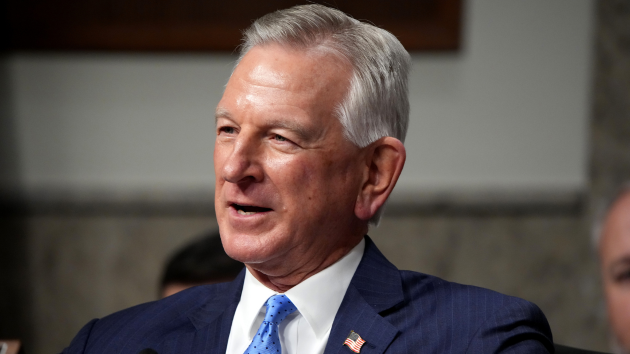As Harris weighs VP pick, climate groups say they’re ‘all in’ on campaign
Written by ABC Audio ALL RIGHTS RESERVED on July 26, 2024

(WASHINGTON) — As Vice President Kamala Harris’ presidential campaign gains momentum, many environmental advocacy groups say they’re “all in” to help her win the White House.
Groups like the League of Conservation Voters (LCV), Sierra Club, and NRDC Action Fund have already endorsed her campaign.
Tiernan Sittenfeld, senior vice president for government affairs for the LCV, told ABC News that her organization is eager to support the Harris campaign and said she thinks the goal now should be “building on the progress” of the current administration.
“I think it’s more about building on the progress — the progress of the Biden-Harris Administration on climate and on conservation has been truly historic, and there’s clearly more progress to make,” Sittenfeld said. “And we know that Vice President Harris is committed to doing just that.”
Other environmental organizations, like the Sunrise Movement, known for representing younger voters, are pushing Harris to take her climate policies further than President Joe Biden did during his term.
“You have an opportunity to win the youth vote by turning the page and differentiating from Biden policies that are deeply unpopular with us,” several youth groups wrote in a letter to Harris, specifically citing approvals for new oil and gas projects under the Biden-Harris Administration.
Climate groups have praised several key accomplishments, including Harris casting the tie-breaking vote to pass the Inflation Reduction Act in 2022, a tentpole policy the Biden-Harris Administration calls the largest package of climate policies and spending in U.S. history. She also investigated fossil fuel companies as California attorney general, most notably Exxon Mobil over allegations they may have misled the public about the risks of climate change linked to burning fossil fuels.
As Harris considers who to select as her vice president, the climate and environmental records of the leading candidates for the VP job will surely be part of the evaluation process.
“We very much hope and expect that she will pick a running mate who shares her commitment, who will center these issues — that they will bring a whole government approach, especially to tackling the climate crisis that in the way that the Biden-Harris Administration has done over the last three and a half years,” Sittenfeld said.
Here’s where the four leading candidates to be Harris’ VP pick stand on some of the most important climate and environmental issues:
North Carolina Gov. Roy Cooper
North Carolina Gov. Roy Cooper has pushed a suite of policies in response to the negative impacts of climate change experienced by his state after it was devastated by hurricanes and severe flooding early in his tenure.
During his two terms as governor, Cooper signed executive orders establishing greenhouse gas emissions reduction goals for the state — aiming for a 50% reduction by 2030 and net zero emissions by 2050. He also ordered a reduction in energy consumption in state-owned buildings and increased the number of registered zero-emissions vehicles in the state.
Cooper has also made environmental justice initiatives a priority during his tenure, establishing the Governor’s Environmental Justice Advisory Council last fall.
Cooper testified before the U.S. House of Representatives’ Natural Resource Committee in 2019 to urge Congress to take action on climate change, noting the devastation his state experienced in the wake of Hurricane Matthew in 2016 and Hurricane Florence and Tropical Storm Michael in 2018, in addition to periods of severe flooding over the years.
“Just like many places in our country and across the globe, we are beginning to feel the harsh effects of climate change on our communities and on our economy,” Cooper testified. “Scientists have found that climate change makes weather more erratic. It makes storms larger and more powerful. And it intensifies heavy rainfalls and drought.”
Kentucky Gov. Andy Beshear
Kentucky Gov. Andy Beshear has largely avoided speaking explicitly about climate change in public remarks and favors what his administration calls a “balanced” approach to energy — using a mix of fossil fuels and renewables. Some reports have speculated that Beshear’s energy strategy and his mixed record on environmental issues may be a response to Kentucky’s position as one of the largest coal-producing and coal-burning states in the nation and being a Democratic governor in a largely Republican state.
Beshear says Kentucky becoming “the electric vehicle battery capital of the United States” is one of his “signature accomplishments” as governor, noting $8 billion in investments across two battery manufacturing plants that he says have created 7,000 jobs. He also signed legislation that made $30 million in state funding available for a new natural gas pipeline in the western portion of the state in 2022, calling the project a boon for economic development in the region.
“When world-class companies look to locate here, they need world-class infrastructure to support their needs. I’m happy to be alongside these other leaders to announce that that’s exactly what we’re going to do in building this line,” Beshear said at the time in a press release.
As governor, Beshear declined to apply for the Environmental Protection Agency’s Climate Pollution Reduction Grants program — making his state one of just a handful, and the only with a Democratic governor, to do so — with his administration saying at the time that some of Kentucky’s larger cities were better positioned to apply.
Earlier this year, he vetoed a bill that would make it more difficult to shut down retired coal plants in the state, writing that it was “inconsistent with Kentucky’s all-of-the above energy policy” and that it would delay new energy projects and “jeopardize economic development.” His veto was overridden by the state’s Republican-led General Assembly.
Pennsylvania Gov. Josh Shapiro
Gov. Josh Shapiro has emphasized the economic benefits of expanding alternative sources of energy in a state where natural gas production plays a huge role in its economy. Pennsylvania is the second-largest producer of natural gas in the country, according to the Energy Information Administration.
Similar to President Biden, Shapiro emphasizes the potential to create jobs in many of his climate and energy policies. He secured $400 million in federal funding from the EPA to reduce pollution from industrial sources and create clean energy jobs.
Shapiro has faced criticism from some environmental groups for working with natural gas companies to develop climate and pollution monitoring programs in the state. Shapiro has promoted developing hydrogen energy hubs in the state and capping abandoned oil and gas wells which can be a source of methane gas and other pollution. He also developed his own plan to set a price on carbon that he said would reduce the state’s emissions and customers energy bills and updated the state’s energy standards to attract more investment in renewable energy.
That standard requires the state to get 50% of its electricity from diverse energy sources including solar, wind, small nuclear reactors, fusion, and hydropower by 2035, according to the website for his proposed budget. A report by the PennEnvironment Research and Policy Center found that Pennsylvania was 50th when it came to new renewable energy since 2013.
Gov. Shapiro was endorsed by Conservation Voters of Pennsylvania when he ran for office in 2022, with the group citing his investigations of oil and gas companies and his work to enforce environmental laws as the state’s attorney general.
Arizona Sen. Mark Kelly
Sen. Mark Kelly has served on multiple committees that deal with climate and environmental issues in the Senate, including the Committee on Energy & Natural Resources and the Environment and Public Works Committee. He has been outspoken about the need to address climate issues that are impacting his home state, such as extreme heat and drought.
He claimed credit for securing $4 billion in the Inflation Reduction Act for the U.S. Bureau of Reclamation to help Colorado River basin states manage drought. He and Arizona Sen. Kristen Sinema also co-sponsored the Growing Climate Solutions Act to make it easier for farmers to participate in climate programs.
Kelly has cited his experience as an astronaut as part of his motivation for tackling climate change, saying that from space he saw how fragile the Earth’s atmosphere can be.
“All seven and a half billion of us, we live on an island in our solar system. Make no mistake we’ve got no place else to go and between my first flight and my fourth one it was a decade, and I saw some changes in our planet,” he said in a 2020 appearance on “The View,” specifically mentioning deforestation in places like the Amazon.
“We’ve got to figure out a way to get from fossil fuels to get from more renewable energy, I think we’ve got a decade or so to figure this out but we can’t continue to wait,” he added.
He was endorsed by the League of Conservation Voters in 2020 and 2022 and has a 93% lifetime approval score from the organization.
Copyright © 2024, ABC Audio. All rights reserved.

 KVSP
KVSP 




